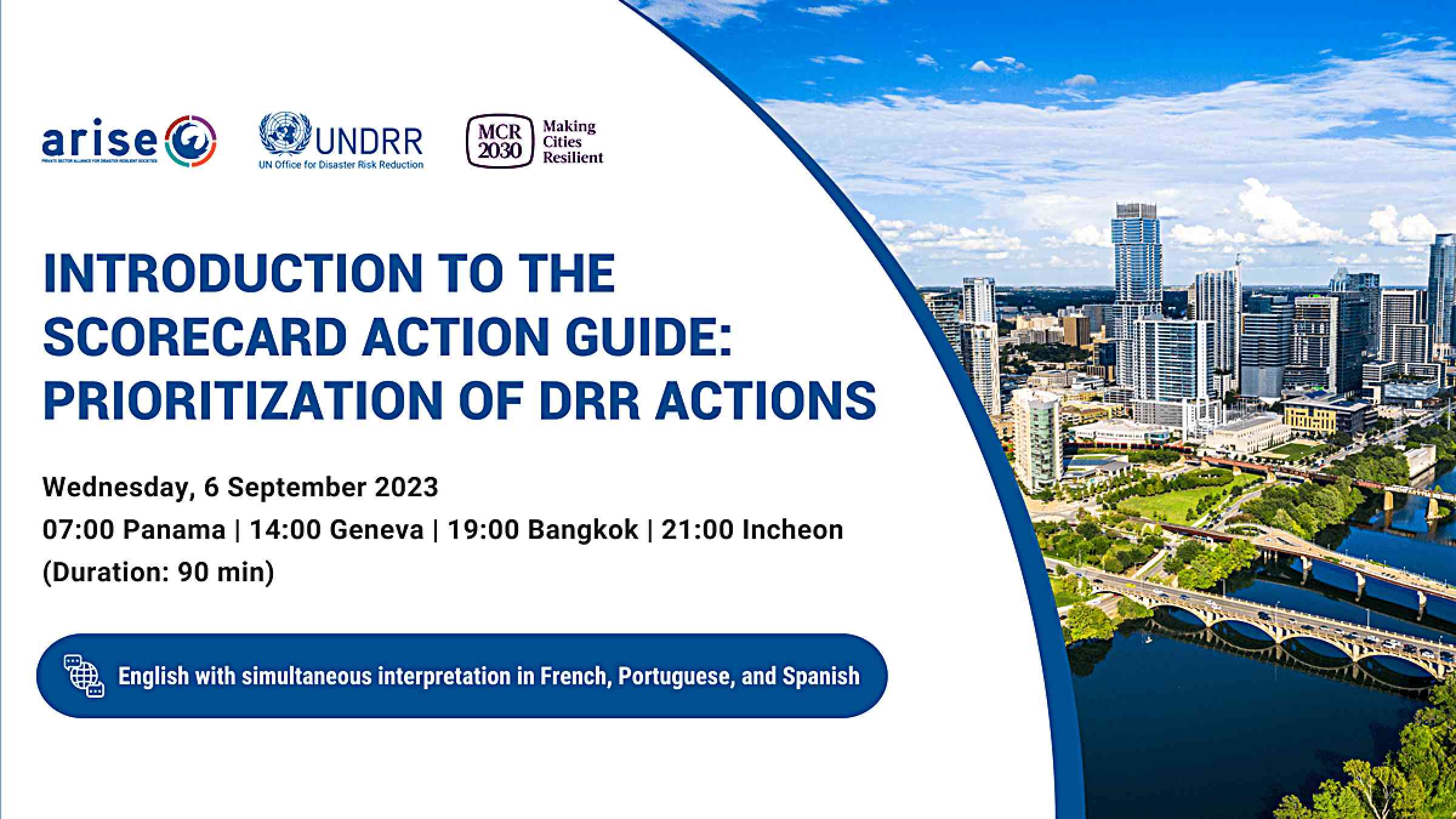[UNDRR GETI-ARISE-MCR2030] Introduction to the Scorecard Action Guide: Prioritization of DRR Actions

- English
Recording
Recording is also available in French, Portuguese and Spanish.
Download Publication and Templates
Description
Building resilience may require a city to address weaknesses or add strengths in various systems like infrastructure, emergency response, health, welfare, education, social, economic, and environmental. Each system has different owners, interests, stakeholders, and timelines, making it challenging to manage technical requirements and critical pathways. The UNDRR Disaster Resilience Scorecard for Cities, with its "Ten Essentials for Making Cities Resilient," helps cities understand their DRR strengths and weaknesses to strengthen resilience strategies. However, prioritising actions and deciding how best to move forward can be a challenge. This is because the Scorecard and other similar tools are less effective at identifying what is most needed, how to address the risk, the feasibility of proposed actions, and prioritisation.
This webinar session aims to introduce the Scorecard Action Guide and present a methodology for cities to frame and prioritise their programmes of action using data from the Scorecard assessment.
The training will be divided into 3 parts:
Introduction to the scorecard process and creating a prioritized action plan
- Overview of the scorecard process
- Compiling the ‘Resilience Agenda’ of actions needed to reduce disaster risk
- Creating an effective plan with clear projects by grouping identified actions
Establishing a multi-year plan
- Identifying the benefits that justify the investment required in each project
- Establishing the sequence and priorities for what may be a multi-year program
Balancing local needs
- Creating the balance between the best value in DRR terms and the political, financial, and other realities
- Next steps moving towards implementation
Speakers
- Peter Williams, Ph.D. - Chair, ARISE-US, IBM Distinguished Engineer (Retd)
- Benjamin Ryan, Ph.D., MPH, REHS - Professor, Thomas F. Frist Jr. College of Medicine at Belmont University
About Organizers
ARISE – Private Sector Alliance for Disaster Resilient Societies, is a network of private sector entities committed to helping to implement the Sendai Framework, and led by UNDRR. ARISE mobilises and facilitates the private sector to carry out risk-informed investments and to apply business practices that reduce and prevent the creation of risk, build resilience and enhance recovery from disasters, in line with the Sendai Framework. Organised into national networks, of which there are currently 28 worldwide, ARISE focuses on four priorities: SMEs; integrating DRR into investment decisions; incentivising DRR within the insurance industry, and resilient infrastructure.
UNDRR Global Education and Training Institute (UNDRR GETI) was established in 2010 to develop a new cadre of professionals in disaster risk reduction and climate change adaptation to build disaster resilient societies. GETI has a global mandate to provide capacity building support to mainstream disaster risk reduction and climate change adaptation into sustainable development; convene and support inter-city learning to strengthen resilience (Making Cities Resilient); and to provide capacity building and best practice sharing support to national training institutions working on resilience issues. Based in Incheon, the Republic of Korea, UNDRR GETI is also the global secretariat of the Making Cities Resilient 2030 (MCR2030).
Making Cities Resilient 2030 (MCR2030) is a unique cross-stakeholder initiative for improving local resilience through advocacy, sharing knowledge and experiences, establishing mutually reinforcing city-to-city learning networks, injecting technical expertise, connecting multiple layers of government and building partnerships. Through delivering a clear 3-stage roadmap to urban resilience, providing tools, access to knowledge, monitoring and reporting tools. MCR2030 will support cities on their journey to reduce risk and build resilience. MCR2030 aims to ensure cities become inclusive, safe, resilient and sustainable by 2030, contributing directly to the achievement of Sustainable Development Goal 11 (SDG11) “Make cities and human settlements inclusive, safe, resilient and sustainable”, and other global frameworks including the Sendai Framework for Disaster Risk Reduction, the Paris Agreement and the New Urban Agenda.